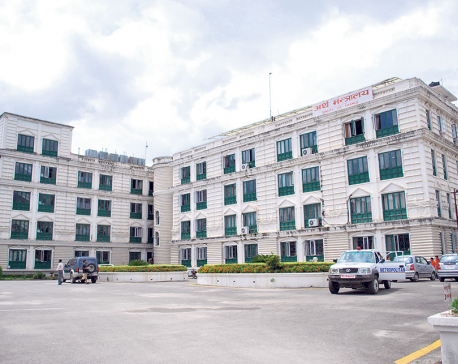
OR
Slow Capital Spending
Approve working procedure for programs before including it in budget, house panel tells govt
Published On: March 19, 2019 04:00 AM NPT By: Republica | @RepublicaNepal
KATHMANDU, March 19: The Finance Committee of parliament has instructed the government to bring budget from the upcoming fiscal year only after the approval of working procedures and directives required to implement projects and programs introduced in the budget speech.
The parliamentary committee's instruction comes in the wake of growing complaints that the delay in drafting and approving of necessary working procedures and directives for the implementation of projects and programs was one of the major reasons behind slow spending of budget.
Following discussion with secretaries and senior officials of various ministries and government agencies on Monday, the parliamentary panel issued a six-point instruction to the government to fully implement the budget.
Speaking at the meeting, most of the lawmakers criticized the government's failure to boost capital spending in the current fiscal year even after timely approval of the budget from parliament.
Senior government officials attributed the delay in the approval of working procedure and directive of projects and programs in the budget, confusions about jurisdiction of working areas between federal and sub-national governments and lack of timely integration of government employees to slow capital spending in the current fiscal year.
“We have many projects and programs in the budget. But we start to draft the working procedure of such programs only after mid-July. This causes delay in the implementation and performance of such projects,” Dinesh Kumar Thapaliya, secretary of Ministry of Federal Affairs and General Administration, said in the meeting.
According to the Financial Comptroller General Office, the government has spent only 28.89 percent of the capital budget allocated for the current Fiscal Year 2018/19. Out of Rs 313.99 billion allocated for development projects in the current fiscal year, the government has spent managed to spend only Rs 91.54 billion as of March 17.
Finance Secretary Rajan Khanal, however, told the parliamentary committee meeting that the capital spending is actually higher as the fiscal transfer to sub-national governments come under the heading of the recurrent expenditure.
He said that the government will attain 85 percent capital expenditure in the current fiscal year compared to 70 to 80 percent of spending in the last seven years. Khanal added that the initial confusions about who will implement many development projects in the transitional phase of federalism has led to poor performance of such projects.
The problem in handover of various functionaries to sub-national governments has hit the performance of road projects, according to Madhusudan Adhikari, secretary at the Ministry of Physical Infrastructure and Transport (MoPIT).
Out of 33 division road offices, the federal government has handed over only 19 offices so far.
“The delay in handing over these offices has affected the progress of many road projects,” he added.
MoPIT, a ministry with one of the highest capital budget, has managed to spend only 38 percent of the capital expenditure allocated to it, according to the ministry.
Rs 35b needed for feasibility study of Kathmandu-Kerung Railway
Meanwhile, the government estimates that it may need Rs 30 billion to Rs 35 billion for the feasibility study of much-hyped Kathmandu-Kerung Railway project, while 5 billion to 7 billion rupees would be required for such study of Birgunj-Kathmandu Railway project.
Speaking at a meeting of the Finance Committee of parliament on Monday, Madhusudan Adhikari, secretary at the Ministry of Physical Infrastructure and Transport (MoPIT), said that the ministry can complete the feasibility study of the Kathmandu-Kerung railway project within two years.
“For the feasibility study, we need a budget of Rs 30-35 billion. The Ministry of Finance should allocate Rs 15 billion to Rs 20 billion in the first year while the remaining budget can be provided in the next year,” he added.
He also said that there was a need to revise upward the ceiling provided by the National Planning Commission for the ministry to include the feasibility study of the Birgunj-Kathmandu railway project that requires an estimated Rs 5 billion to Rs 7 billion.
The pre-feasibility studies of both railway projects have already been carried out, according to secretary Adhikari.
You May Like This

FHAN unhappy over government budget and programs
KATHMANDU, June 8: Commenting on the government’s budget and programs for upcoming Fiscal Year 2019/20, the Federation of Handicraft Associations... Read More...

Insurance coverage reaches 18 percent of total population
KATHMANDU, May 28: Insurance coverage has reached 18 percent of the total population of the country. ... Read More...

Coliform in water caused cholera case in capital
KATHMANDU, May 9: Coliform present in water is the main cause of the cholera case in the capital, according to... Read More...






Just In
- Challenges Confronting the New Coalition
- NRB introduces cautiously flexible measures to address ongoing slowdown in various economic sectors
- Forced Covid-19 cremations: is it too late for redemption?
- NRB to provide collateral-free loans to foreign employment seekers
- NEB to publish Grade 12 results next week
- Body handover begins; Relatives remain dissatisfied with insurance, compensation amount
- NC defers its plan to join Koshi govt
- NRB to review microfinance loan interest rate











Leave A Comment